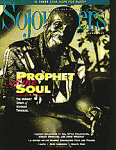A delegation organized by U.S. peace groups visited Haiti September 28-October 1 to establish a nonviolent presence in anticipation of exiled President Jean-Bertrand Aristide's scheduled October 30 return. As we go to press in mid-October, the Haitian military has refused to allow Aristide's return. Sojourners' Joe Nangle, O.F.M., was a member of the peace delegation. - The Editors
A U.S. congressional leader said recently that achieving democracy in Haiti is not worth the loss of one American life. According to Haitian church leader Rev. Antoine Adrien, dozens of American citizens are contradicting that statement today in his country.
In a mid-October press conference, Adrien pointed to the successful efforts of eight peace organizations (including Sojourners) to place unarmed peace keepers in violence-prone areas of Haiti. Under the name "Cry For Justice," these advocates of nonviolence remain as the only international body left in the chaos that is Haiti today.
In late September a religious delegation from the United States went to Haiti with the first Cry For Justice group on the occasion of the second anniversary of President Jean-Bertrand Aristide's ouster. The delegation agonized over the best way to mark the September 30 anniversary of the 1991 military takeover. When members heard that several Haitian religious leaders planned to travel to Washington, D.C., to mark the anniversary, the news suggested an appropriate action: If Haitians were not able to commemorate at home the ouster of their president, perhaps Americans could. The visitors decided to hold a religious service in Port-au-Prince at the same time the Haitians did in Washington, D.C.
The site chosen was the church where--less than three weeks earlier--a wealthy Aristide supporter, Antoine Izmery, had been dragged into the street and executed by a group of police-protected thugs (called "attachés"), and where two weeks later the Haitian minister of justice, Guy Malary, would meet a similar fate. The Americans celebrated Communion, then went in procession to bless the place where the attachés had murdered Izmery--a spot just outside the church where his bloodstains still marked the ground. This religious-political action took place without incident--something that 10 days later would have proven impossible.
During their few days in Haiti, the delegation found that Aristide's return under U.N. protection remains central to the country's future. "It is a window of opportunity," said one Haitian religious leader, "and if it slams shut, we shall not have democracy in Haiti for generations to come."
EVEN IF Aristide manages to re-enter Haiti safely (which is not at all a given as this is written), he may not be able to govern. Some sympathetic observers speculate that certain areas of the country might be secured for Aristide and slowly his base expanded until he has general control.
This scenario gives rise to a full-blown discussion of armed United Nations peacekeepers. The intention of sending such a force raised serious questions for members of the peace groups. Can armed troops ever bring about a peaceful settlement, especially in such a volatile situation as that of Haiti today? Will not the result of such "intervention" (a word strongly rejected by Haitian religious leaders) inevitably exacerbate the problem, as Somalia has so vividly shown? How could believers in nonviolence agree to the presence of armed military as part of a solution?
Yet as the September delegation met with their national and international contacts in Haiti, they heard near-universal acceptance of the need for some outside force. In Haiti, said one observer, the fox is guarding the chicken coop. Another Haitian, a close advisor of Aristide's, pointed out the obvious: "Only one side has arms."
The army and police force remain under the control of two powerful enemies of Aristide: Raoul Cédras and Michel François. They are seen as true international outlaws, said to be up to their necks in the $200-$500 million yearly drug trade that passes through Haiti. Cédras and François saw the Governors Island agreement on Aristide's reinstatement as a vehicle for consolidating their power and preventing any return to democracy. Many Haitians, therefore, see no alternative to an outside military force, at least to ensure the removal of Cédras and François and then to retrain the military and the police.
What is the proper U.S. role for Haiti? Most Haitians have etched in their memories the 1915 to 1934 U.S. occupation of their country. As a result of it and more recent U.S. actions around the Caribbean (including Grenada and Panama), many people in Haiti speak with discomfort and mistrust about U.S. intentions toward their country.
Yet it is clear to many that the United States can continue to play a useful part in the restoration of democracy in Haiti. President Clinton has signaled that the return of President Aristide is non-negotiable. At this writing the Clinton-initiated blockade and the freeze on wealthy Haitian's bank accounts strike many--including Aristide himself--as the best means of getting the Governors Island agreements implemented, this time without delay.
Many feel that initiatives like Cry for Justice will have a positive impact on the situation in Haiti. A stark alternative to armed intervention, these peace groups deal on a person-to-person basis. They go to Haiti armed only with the conviction that the country deserves a chance to practice democracy. They face many of the same risks as ordinary Haitians and can do only as much as the situation allows. Their efforts are seen by some as a first baby-step in a new journey for the peace movement operating in a world where the commonwealth of nations seeks to hold sovereign states accountable.
Cry For Justice is welcomed by the majority of the Haitian population, the lavalas (literally "flash flood," which refers to the overwhelming majority that supports Aristide). When this history is written, it may well be said that this national and international lavalas finally brought respect for the will of Haiti's long-suffering people.

Got something to say about what you're reading? We value your feedback!
